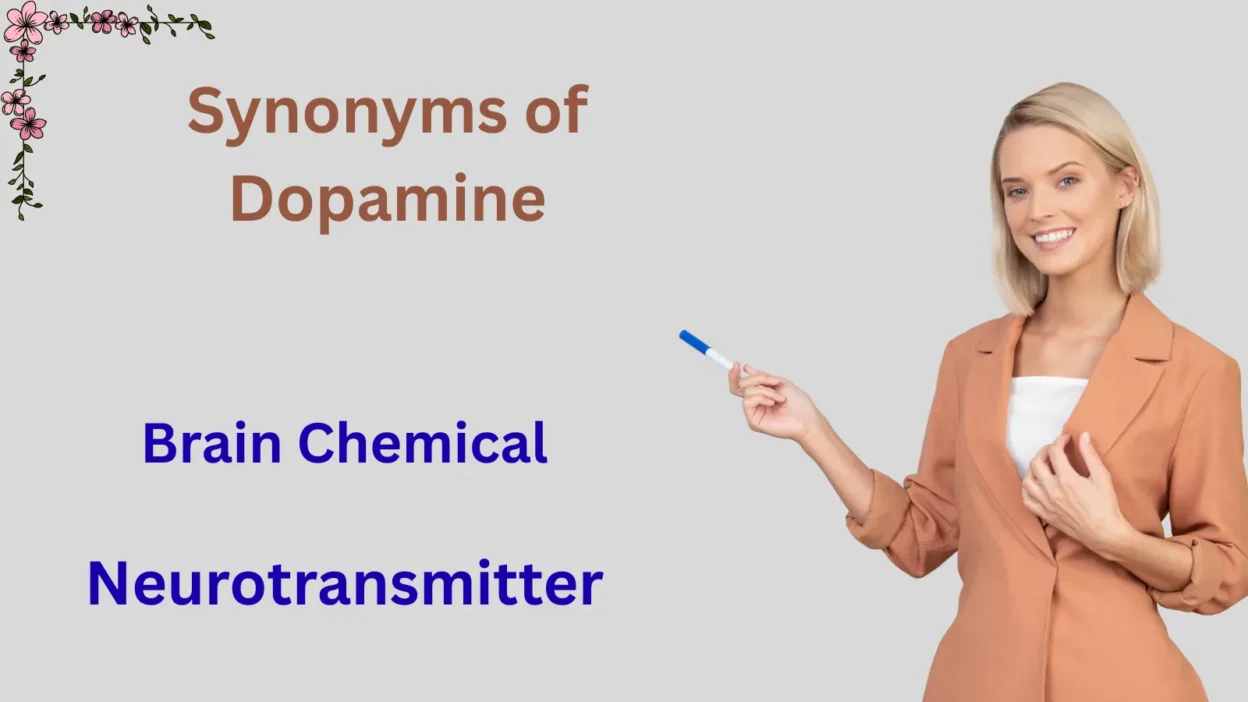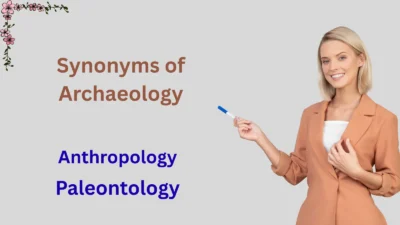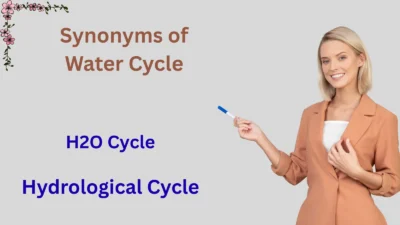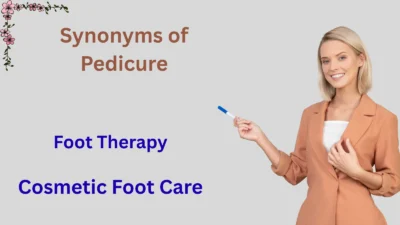Synonyms of dopamine—such as reward chemical, happy signal, and motivation molecule—offer different ways to describe this powerful brain chemical. “Reward chemical” highlights the joy we feel after doing something good, while “motivation molecule” shows how it drives us to act and chase goals. These terms capture both the science and the emotions connected to dopamine.
If you write about the brain, moods, or daily habits, the right synonym sets the tone. In this guide, we look at simple ways to name dopamine and when to use them.
These synonyms of dopamine make writing clear and fun. They also help show how this tiny chemical shapes joy, focus, and drive in daily life.
What Does Dopamine Mean?
Dopamine is a brain chemical that sends signals between brain cells, helping control mood, joy, action, focus, and learning. Too little dopamine can cause sadness or illness. A healthy level gives balance and drive.
When you use the word, dopamine can make people think of:
- Happiness and joy
- Energy to act
- Cravings or habits
- How the brain works
Synonyms of Dopamine with Usage Guidance
1. Neurotransmitter
Meaning: A chemical messenger in the brain.
Example: “Dopamine is a neurotransmitter linked to reward.”
Use When: Writing scientifically or academically.
2. Brain Chemical
Meaning: An Informal way to describe chemical messengers.
Example: “Your brain chemicals affect your mood.”
Use When: Explaining neuroscience in simple terms.
3. Reward Chemical
Meaning: Highlights dopamine’s role in the brain’s reward system.
Example: “Exercise triggers the release of reward chemicals.”
Use When: Popular science or wellness content.
4. Pleasure Molecule
Meaning: Suggests dopamine creates feelings of joy.
Example: “That rush of happiness comes from the pleasure molecule.”
Use When: Casual, motivational, or lifestyle writing.
5. Motivation Molecule
Meaning: Focuses on dopamine’s role in drive and ambition.
Example: “Dopamine is often called the motivation molecule.”
Use When: Self-help, productivity, or coaching contexts.
6. Feel-Good Chemical
Meaning: Widely used phrase for brain chemicals linked to happiness.
Example: “Listening to music boosts feel-good chemicals.”
Use When: Conversational and wellness-related topics.
7. Happiness Chemical
Meaning: Simplifies dopamine’s link to joy.
Example: “The happiness chemical helps you feel rewarded.”
Use When: Explaining mood in a friendly, simple way.
8. Euphoria Messenger
Meaning: Highlights intense joy or excitement.
Example: “Extreme sports trigger the brain’s euphoria messenger.”
Use When: Describing thrilling or high-energy experiences.
9. Joy Hormone
Meaning: Informal synonym likening dopamine to hormones.
Example: “That burst of energy is thanks to the joy hormone.”
Use When: Fitness or mental health discussions (non-technical).
10. Chemical of Desire
Meaning: Links dopamine to craving and wanting.
Example: “Addictions often exploit the brain’s chemical of desire.”
Use When: Discussions of cravings, habits, or addictions.
11. Satisfaction Chemical
Meaning: Represents the sense of fulfillment after an action.
Example: “Finishing a project boosts the satisfaction chemical.”
Use When: Productivity or achievement-focused writing.
12. Drive Molecule
Meaning: Stresses dopamine’s role in persistence.
Example: “Entrepreneurs often run on the drive molecule.”
Use When: Business or motivational contexts.
13. Inspiration Chemical
Meaning: Relates dopamine to bursts of creative energy.
Example: “That idea sparked thanks to your inspirational chemistry.”
Use When: Creative, artistic, or self-improvement writing.
14. Excitement Neurotransmitter
Meaning: Connects dopamine with thrill or anticipation.
Example: “The excitement neurotransmitter surges during a concert.”
Use When: Events, entertainment, or lifestyle writing.
15. Anticipation Chemical
Meaning: Refers to dopamine’s role in wanting and waiting.
Example: “The anticipation chemical spikes before rewards.”
Use When: Psychological or behavioral contexts.
16. Desire Neurotransmitter
Meaning: Focuses on dopamine’s craving function.
Example: “The desire neurotransmitter keeps us chasing goals.”
Use When: Addictive or motivational behaviors.
17. Reward Messenger
Meaning: Dopamine communicates success or achievement.
Example: “Your brain’s reward messenger fires after small wins.”
Use When: Coaching, self-improvement, or habit-building content.
18. Thrill Chemical
Meaning: Tied to adrenaline-like excitement.
Example: “Roller coasters release the thrill chemical.”
Use When: Fun, adventurous, or entertainment writing.
19. Chemical High
Meaning: Refers to pleasure caused by brain chemistry.
Example: “Social media likes give a chemical high.”
Use When: Cultural critique or informal discussions.
20. Craving Molecule
Meaning: Emphasizes dopamine’s role in wanting more.
Example: “Sugar activates the craving molecule.”
Use When: Addiction, diet, or behavioral psychology.
21. Motivation Neurotransmitter
Meaning: A more formal way to describe dopamine.
Example: “The motivation neurotransmitter keeps us pursuing rewards.”
Use When: Professional psychology or science writing.
22. Behavior Shaper
Meaning: Dopamine influences choices and actions.
Example: “The brain’s behavior shaper pushes us toward pleasure.”
Use When: Social sciences, psychology, or habit-forming contexts.
23. Reward Driver
Meaning: Suggests dopamine directs goal-seeking.
Example: “Your reward driver keeps you pushing forward.”
Use When: Self-help and motivational tone.
24. Mood Booster
Meaning: Simplifies dopamine’s role in positive feelings.
Example: “Exercise works as a natural mood booster.”
Use When: Fitness and wellness writing.
25. Chemical Messenger
Meaning: General term for neurotransmitters.
Example: “Dopamine is a vital chemical messenger.”
Use When: Scientific but approachable explanations.
26. Happiness Messenger
Meaning: A friendly metaphor for dopamine’s impact.
Example: “Chocolate releases the happiness messenger.”
Use When: Casual, fun, lifestyle-focused writing.
27. Brain Reward Signal
Meaning: Technical description of dopamine’s function.
Example: “The brain reward signal motivates habit formation.”
Use When: Scientific or behavioral psychology contexts.
28. Joy Trigger
Meaning: Dopamine sparks moments of delight.
Example: “Compliments often act as a joy trigger.”
Use When: Light, lifestyle, or creative writing.
29. Positive Feedback Chemical
Meaning: Dopamine reinforces good experiences.
Example: “The positive feedback chemical encourages repetition.”
Use When: Psychology, habit-building, or education.
30. Motivation Hormone
Meaning: Informal but relatable synonym.
Example: “The motivation hormone keeps us chasing dreams.”
Use When: Wellness or motivational writing, less scientific.
From flirty texts to professional responses, Smartraply.com delivers ready-to-use lines that make conversations easy and fun.
Choosing the Right Synonym Based on Tone and Context
- Scientific & Professional Writing: Use neurotransmitter, chemical messenger, brain reward signal, motivation neurotransmitter.
- Lifestyle & Wellness: Choose feel-good chemical, happiness chemical, mood booster, joy trigger.
- Motivational or Productivity: Opt for motivation molecule, drive molecule, reward driver, inspiration chemical.
- Addiction & Psychology: Use craving molecule, chemical of desire, anticipation chemical.
- Casual & Pop Culture: Go with pleasure molecule, thrill chemical, chemical high.
Cultural Note: Terms like feel-good chemical or happiness hormone are widely used in wellness blogs, while reward neurotransmitter or positive feedback chemical work better in academic or psychological contexts. Matching tone to the audience makes your writing credible and engaging.
Conclusion
Dopamine is more than a brain chemical. It is the spark of joy, focus, and drive. Using synonyms of dopamine, like “reward chemical” or “motivation signal,” makes the idea easy to grasp. These words give life to both science and feeling.
Writers can choose a synonym to fit the mood, tone, or subject. In health, it may show balance. In daily life, it may show energy or excitement. Each term adds a new shade of meaning.
By exploring synonyms, you open doors for readers to connect with the science. In the end, the right choice of words makes your message clear, strong, and human.





